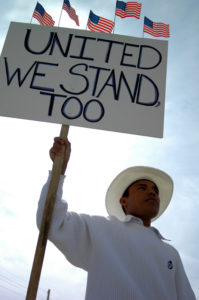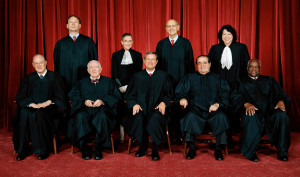40 Years Ago Today, We Changed the World (part 3—Inside the Armories)
Part 3: Inside the Armories
Part 3 of a series of reminiscences of the April 30/May 1, 1977 occupation at the Seabrook, NH nuclear power plant construction site, and its aftermath. If you missed Part 1, read it here. At the bottom of that page, you’ll find a link to Part 2, and at the bottom of Part 2, a link back here.
In Manchester at least, we were all held in one big room. Each affinity group had an area, and we kept our own areas clean. All the poles that held up the ceiling were numbered, so we had an easy system to identify our locations within the large floor.
Small-to-Large-Group Consensus Decisions
Have you ever tried to get even 70 people to agree on anything? Even with 700 people in the Manchester Armory, we maintained a commitment to consensus; we did not move forward organizationally until everyone was OK with the decision. That didn’t mean everyone was in total agreement, but it did mean that the people who preferred another choice were OK with going forward after their concerns were heard. We had numerous decision-making meetings about strategy, about the roles of our support people on the outside, and about how we were being presented to the world. And consistently, we were able to reach rapid consensus.
How? By using hubs and spokes on top of the affinity group structure: Each affinity group selected a spokesperson to represent our views to a circle of spokespeople. The representative was not empowered to make decisions on our behalf, but to express our views and bring the views of other groups back to the affinity hubs to discuss whatever issues those other groups’ spokespeople had brought up.
Over and over, this structure, which sounds cumbersome and slow from a distance, proved to work well and work quickly. We settled even the most complex decisions through consensus, and that consensus was always achieved within two hours or less—sometimes just a few minutes. And because every issue or concern was explored, and we only implemented after no one was blocking, the decisions we reached carried weight and took root smoothly and rapidly; no one was trying to sabotage them, because we all felt ownership of the process.
Creating a Learning Community
Another exciting piece was the way we took advantage of our time together in a confined empty space to teach and learn from each other. You could call it “University Within Walls.”
Detainees offered a myriad of workshops around energy issues, green living/self-sufficiency, creating inclusive and active communities, environmental justice, and social change. All of us had expertise in something, and many were willing to share their knowledge. Some of the offerings, as I remember them:
- Nonviolence theory and practice
- Understanding the mechanics of—and problems with—nuclear power
- Building quick, cheap and easy do-it-yourself alternative energy projects
- Organic food production and preparation
- Organizing and fundraising skills
- How to get media coverage
- Strategy of social change
- Meeting facilitation that works
Workshop leaders would put up notices or announce sessions at meetings, including the nearest pole number.
From what I could see, it looked like nearly all the detainees were taking advantage of this opportunity, so almost all of us emerged from our incarceration with more knowledge and better skills. And from what I heard afterward, similar education was happening in the other armories. This is probably one reason why so many Clamshell Alliance folks have remained involved in social change all these decades later.
Reaching Past the Choir
A few days into our incarceration, some of us started realizing that we had a captive audience for our message: the young National Guard reservists called up to ensure security and order. Since we were all trained in nonviolence and a pretty orderly group—other than two detainees who sneaked out, made a run to the nearest Haagen Dazs, and were re-arrested bringing back ice cream to share—they didn’t have a lot to do.

So a lot of us started hanging out with the Guardsmen (I don’t remember any women in uniform) and chatting them up. We asked some questions about what being in the Guard was like, what they liked to do in their spare time—and what they knew and felt about nuclear power and our protest.
Clamshell was deep in the counterculture, with new ways to make decisions, a willingness to challenge any authority, and the scruffy hippie look of 1970s activism. Yet, among this very non-counterculture audience, we found most of them open to talking, and some of them open to changing their positions. As Rolling Stone described it back then, “But the prisoners hung on, politicizing their jailers, the guardsmen, whom they treated as friends.”
For me, that was the only the second time I’d reached across to people I saw as “on the other side.” The first was at a peace demonstration at Wright-Patterson Air Force Base in Ohio, a couple of years earlier. It had felt like a revolutionary act, humanizing each other and finding places of commonality while defusing tension. Since then, it’s been a part of my social change toolkit.
Part 4 will look at what Clamshell and the Seabrook Occupation accomplished in the wider world, the ripples of impact we had that continue to this day.









